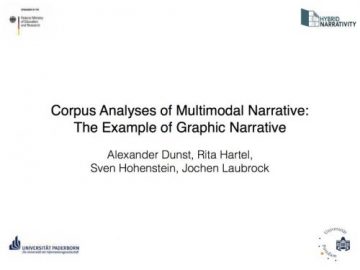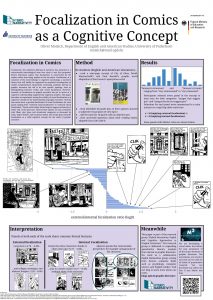A brief summary of some of the work we’ve been doing in our group can now be found on the blog of TORCH, the University of Oxford’s Research Centre in the Humanities. As part of its activities, Oxford has recently started a network and series of lectures on graphic narrative titled „Comics and Graphic Novels: The Politics of Form“. Organized by Dominic Davies, a British Academy post-doctoral fellow in the Faculty of English, the network has already welcomed speakers such as David Lloyd and Roger Sabin. You can read the blog entry and find more about the network’s activities here.
Autor: rst
Poster und Prospekt für die Konferenz „The Empirical Study of Comics“
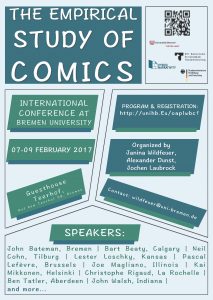
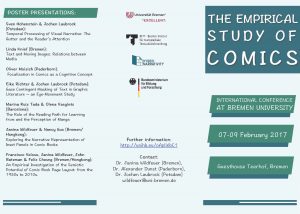
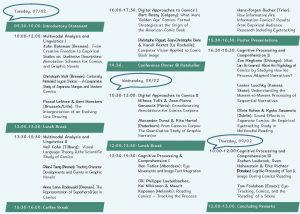
Edited Volume Under Contract with Routledge
We’re happy to announce that our collection of essays Empirical Approaches to Comics Research: Digital, Multimodal and Cognitive Methods is now under contract with Routledge and will be published in the series „Advances in Comics Studies“ in late 2017. Alexander Dunst, Jochen Laubrock, and Janina Wildfeuer will edit the volume, which will feature contributions by well-known researchers in computer and cognitive science, linguistics, media and literary studies, including John Bateman, Bart Beaty, Neil Cohn, Christophe Rigaud, Tim Smith and Ben Tatler. The collection will be the first of its kind, establishing the practical and theoretical motivations for the quantitative study of comics, manga, and graphic novels and aim to become a reference for anyone interested in the scientific study of art and literature.
Upcoming Talks
Our two abstracts for the annual meeting of the German-speaking DH association in Bern (DHd 2017, 13-18 February) have just been accepted. Sven Hohenstein and Jochen Laubrock will present work on „Space and time in comics: The role of the gutter on perceived time“, and Jochen Laubrock, Eike Richter, and Sven Hohenstein on „Visual elements of graphic literature: Attention allocation and objective description.“
Jochen Laubrock will also present at ICPEAL 2016 Guangzhou (Dec 7-10) and at the Berlin Comics Colloquium at Humboldt University on 25 January 2017. See: http://www.comic-kolloquium.de/ws-201617/.
Conference Program: The Empirical Study of Comics (7-9 February 2017)
We’re excited to post the program for our upcoming conference, which we’re organizing together with Janina Wildfeuer and which will take place in Bremen in February. It’s a great lineup, featuring some cutting-edge research in what is a growing and increasingly diverse field, and we’re looking forward to meeting colleagues from across Europe and North America. We do have limited seating at the venue, however, so if you want to participate in the conference please get in touch with Svitlana Zarytska at zarytska@mail.upb.de to reserve a spot.
The Empirical Study of Comics
7-9 February 2017
Bremen University, Germany
Venue: Bremen University, Guesthouse Teerhof (Auf dem Teerhof 58, 28199 Bremen)
Tuesday, 7 February 2017:
09:30-10:00: Introductory Statement
10:00-12:00: Multimodal Analysis and Linguistics I
John Bateman (Bremen): From Creative Freedom to Empirical Studies via Qualitative Descriptions: Annotation Schemes for Comics and Graphic Novels
Christoph Wolf (Bremen): Culturally Motivated Layout Choices – A Comparative Study of Japanese Mangas and Western Comics
Pascal Lefèvre & Gert Meesters (Brussels/Lille): The Interpretation of an Evolving Line Drawing
12:00-13:30: Lunch Break
13:30-15:30: Multimodal Analysis and Linguistics II
Neil Cohn (Tilburg): Visual Language Theory and the Scientific Study of Comics
Chiao-I Tseng (Bremen): Tracking Character Developments and Events in Graphic Novels
Anna Lena Rodewald (Bremen): The Representation of Superhero(in)es in Comics
15:30-16:00: Coffee Break
16:00-17:30: Digital Approaches to Comics I
Bart Beaty (Calgary): What Were ‘Golden Age’ Comics: Formal Strategies at the Origin of the American Comic Book
Christophe Rigaud, Jean-Pierre Burie & Karell Bertet (La Rochelle): Computer Vision Applied to Comic Book Images
John Walsh, Shawn Martin & Jennifer St. Germain (Indiana): ‘Spins A Web Any Size’: Topic Modeling a Corpus of American Comic Book Fan Mail
19.30 Conference Dinner @ Ratskeller Bremen
Wednesday, 8 February 2017:
10:30-12:00: Digital Approaches to Comics II
Mihnea Tufis & Jean-Pierre Ganascia (Paris): Crowdsourcing Annotations for Comics Corpora
Alexander Dunst & Rita Hartel (Paderborn): From Canon to Corpus: The Quantitative Study of Graphic Narrative
12:00-13:30: Lunch Break
13:30-15:30: Cognitive Processing and Comprehension I
Ben Tatler (Aberdeen): Eye Movements and Image-Text Integration
Olli Philippe Lautenbacher, Kai Mikkonen & Maarit Koponen (Helsinki): Reading Comics – Tracking the Process
Hans-Jürgen Bucher (Trier): How Informative Are Information Comics? Results from Empirical Audience Research Including an Eyetracking Study
15:30-16:30: Poster Presentations
Sven Hohenstein & Jochen Laubrock (Potsdam): Temporal processing of visual narrative: The gutter and the reader’s attention
Linda Knief (Bremen): Text and Moving Images: Relations between Media
Oliver Moisich (Paderborn): Focalization in Comics as a Cognitive Concept
Julia Round & Paul Fisher Davies (Bournemouth/Sussex): Visual and Verbal Analysis of Misty
Marina Ruiz Tada & Olena Vasylets (Barcelona): The Role of the Reading Path for Learning from and the Perception of Manga
Janina Wildfeuer & Nancy Guo (Bremen): Exploring the Narrative Representation of Inset Panels in Comic Books
Francisco Veloso, Janina Wildfeuer, John Bateman & Felix Cheung (Bremen): An Empirical Investigation of the Semiotic Potential of Comic Book Page Layout: from the 1930s to 2010s.
16:30-18:30 Cognitive Processing and Comprehension II
Joe Magliano (Chicago): What Can Be Learned About the Psychology of Comics by Studying How We Process Adapted Narratives?
Lester Loschky (Kansas): Understanding the Moment-to-Moment Processing of Sequential Narratives
Olivia Rohan & Ryoko Sasamoto (Dublin): Sound Effects in Japanese Comics: An Empirical Eyetracking Study in Multimodal Reading
Thursday, 9 February 2017:
10:00-12:00 Cognitive Processing and Comprehension III
Jochen Laubrock, Sven Hohenstein & Eike Richter (Potsdam): Cognitive Processing of Text and Image During Comics Reading
Tom Foulsham (Essex): Eye-Tracking, Comics, and the ‘Reading’ of a Scene
12:00-13.00 Concluding Remarks
Paper DH 2016 Krakau
Poster IGEL 2016
Call for Papers: The Empirical Study of Comics
7-9 February 2017
Bremen University, Germany
Organized by Dr. Janina Wildfeuer (Bremen) and the Early-Career Research Group “Hybrid Narrativity: Digital and Cognitive Approaches to Graphic Literature”
This conference aims to advance empirical research on comics, broadly understood as ranging from comic strips and series to mangas, graphic novels, and web comics. The study of this medium has witnessed an unprecedented surge of interest over the last two decades and now constitutes an established field of research in its own right. More recently, hermeneutic approaches to comics within literary and cultural studies have been complemented by a wider range of perspectives: from linguistics to computer science, and from psychology to art history. These projects share a willingness to go beyond thematic and qualitative studies of modern and contemporary culture and bring with them a multitude of empirical methodologies drawn from their respective disciplines. Currently, large corpora of comics and graphic novels are in the process of being collected, digitalized, and annotated in Canada and Germany; computer scientists, including in the US and France, are working on annotation schemes that will allow for comprehensive digital description and analysis; and ground-breaking work in experimental psychology is giving us an opportunity to understand how readers process this multimodal art form. Meanwhile, historical studies of circulation, consumption patterns, and interdependences between comics, animation, and illustration, are gaining track as research on comics diversifies and feeds back into formal description.
However, sustained collaboration across research groups and countries remains scarce. It is the aim of this conference to facilitate further collaboration between scholars across disciplines and countries. Empirical comics research offers the chance to transform our understanding of the medium in the coming years. If shared and disseminated widely, digital corpora will provide a representative overview of the form for the first time. Rigorous classification schemes for page layouts are now being proposed that will benefit from critical input, as will mark-up languages and annotation software. Cognitive approaches challenge some of the most dearly-held convictions about comics, and a huge gap remains between narratologists and cognitive scientists with an interest in the study of culture. The empirical study of comics thus promises to generate remarkable synergies if the ideals of open scholarship are embraced.
Please direct enquiries and send 300-word paper proposals to Janina Wildfeuer (wildfeuer@uni-bremen.de) and Alexander Dunst (dunst@mail.upb.de). Presentations may take the form of 20-minute papers in the case of projects that have been completed or are nearing completion; or A3 posters for preliminary results, software applications, and projects currently in the initial phase. The deadline for submissions is 31 May 2016.
Confirmed Speakers:
John Bateman, Bremen University, Germany
Bart Beaty, University of Calgary, Canada
Neil Cohn, Tilburg University, The Netherlands
Lester Loschky, Kansas State University, USA
Joe Magliano, Northern Illinois University, USA
Christophe Rigaud, La Rochelle University, France
Tim Smith, Birkbeck, University of London, UK
Ben Tatler, University of Aberdeen, UK
John Walsh, Indiana University, USA
Paper Accepted for DH Conference 2016 in Cracow
Our jointly-authored talk „Corpus Analysis of Multimodal Narrative: The Example of Graphic Novels“ has now officially been accepted as a long paper at the 2016 Digital Humanities Conference in Cracow. We received some excellent feedback from a total of five peer reviewers, so we’re very happy about this initial response, and now look forward to stimulating discussions in July.
Upcoming Talks
Here’s an update on some of our up-coming talks. More to follow soon, hopefully, when we hear back from the organizers of the DH-conference in Cracow in July 2016:
- Our two abstract for the annual meeting of the German-speaking DH association in Leipzig (7-12 March) have just been accepted, and we’re looking forward to discussions and feedback, as well as meeting up with colleagues and friends. Alexander Dunst and Rita Hartel will be speaking about „The Corpus Analysis of Multimodal Narratives: The Example of Graphic Novels“ („Die Corpusanalyse multimodaler Erzählungen am Beispiel graphischer Romane“), and Jochen Laubrock, Sven Hohenstein and our student helper Alexander Thoß will give a paper titled „Moving around the City of Glass“. See the conference website at: http://www.dig-hum.de/jahrestagung-dhd2016
- Alexander Dunst will also be speaking at the „Digital American Studies Meeting,“ organized by Marc Priewe, which will take place at the University of Stuttgart on 24-25 February and intends to promote the – so far somewhat slow – uptake of the digital humanities within American Studies in Germany; and at the joint Irish and British American Studies Association (IAAS/BAAS, 7-9 April) conference at Queen’s University, Belfast, as part of a panel titled „Digital Scholarship in American Studies“. Here’s the link to that conference: http://www.qub.ac.uk/sites/baasiaas2016/
- Jochen Laubrock will be teaching a graduate course in eye tracking in Athens (4-6 April), and speaking at the Institutskolloquium Psychologie in Würzburg (18 January), the International Meeting of the Psychonomic Society in Granada (5-8 May), and the workshop „Using eye movements to study literacy development“ in Southampton (18 August).

